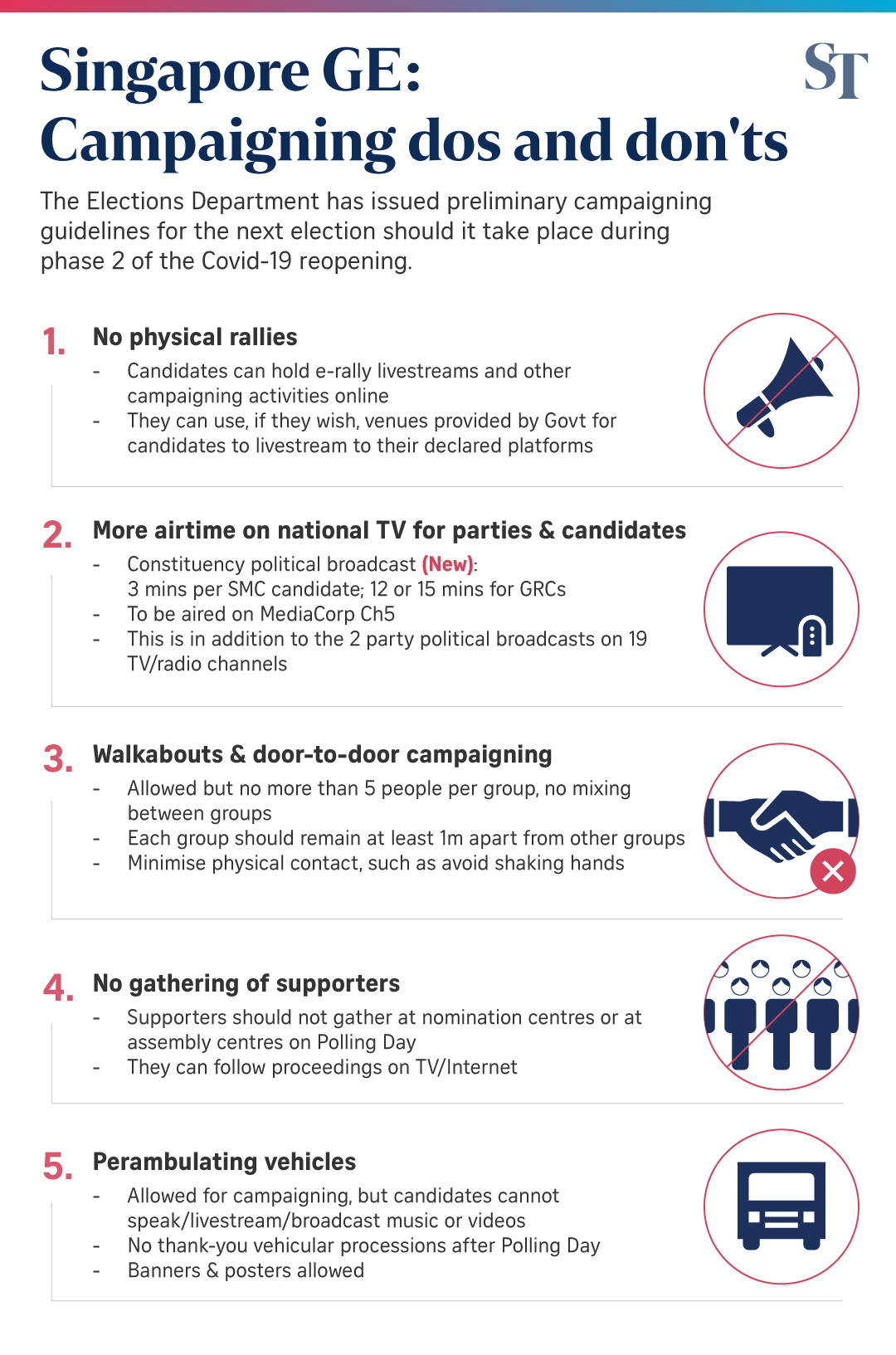S'pore GE: No physical rallies for election campaign, candidates to get TV airtime for constituency political broadcasts
Sign up now: Get ST's newsletters delivered to your inbox

A photo taken on Sept 11, 2015, showing people waiting in line to cast their votes at Pei Chun Public School.
PHOTO: ST FILE
SINGAPORE - There will be no physical rallies if the upcoming general election is held during phase two of Singapore's reopening, with all political parties given extra television airtime instead.
Although walkabouts and door-to-door campaigning will be permitted, groups must not exceed five people and should abide by safe distancing measures, said the Elections Department (ELD) in announcing its preliminary campaign guidelines on Thursday (June 18).
Special livestreaming facilities will also be set up during the campaign period. Candidates will be able to apply to hold e-rallies at these facilities at specific time slots throughout the day during the campaign period.
The ELD said these venues are entirely optional, and more details will be provided after the Writ of Election is issued.
These changes are meant to protect voters' health and safety, while ensuring they have access to campaign messages from all political parties and candidates amid the coronavirus pandemic, it said.
Guidelines may be adjusted depending on the Covid-19 situation at the time the election is called.
"The announcement of these guidelines has no relation to the timing of the general election, which will be decided by the Prime Minister," the ELD said.
In a first, every candidate for the election will be given three minutes of airtime on national television during the campaign as part of new constituency political broadcasts.
These constituency broadcasts will be aired on Mediacorp's Channel 5, and come on top of the two party political broadcasts permitted for each party that will be aired on 19 television and radio channels.
This is a special, one-off arrangement given the ongoing Covid-19 pandemic, ELD said.
Each candidate contesting a single-member constituency will get three minutes of airtime for the constituency broadcasts, and can choose to speak in any of the four official languages.

Each set of candidates in a group representation constituency will be given either 12 or 15 minutes of airtime, depending on whether they are contesting a four- or five-man GRC. Parties can decide whether one or more candidates should speak during the allotted time.
Further details will be released after the Writ of Election is issued, the ELD said.
It advised members of the public to watch these broadcasts from their own homes and not gather in groups larger than what is permitted under the Health Ministry's guidelines.
Under the new rules, the large crowds typically seen on Nomination Day and Polling Day will also not be allowed.
On Nomination Day, party supporters will not be allowed into nomination centres or be permitted to gather in the vicinity.
Only candidates and their proposers, seconders and assentors will be allowed in, as well as accredited media personnel. The proceedings will be covered live on television and other online channels instead.
Rallies and gatherings at assembly centres while supporters wait for election results will also not be allowed to proceed.
Candidates may use vehicles for campaigning - typically lorries or trucks outfitted with loudspeakers - and to broadcast recorded messages. However, they will not be allowed to speak, livestream, or broadcast music or videos from the vehicle.
Traditional thank-you processions after Polling Day are considered "not critical to the campaigning process" and will not be allowed to take place, the ELD said.
On walkabouts, it said there should be no mixing between groups, and each group should remain at least 1m apart from other groups.
Those walking the ground should wear masks and keep all interactions transient. They should also minimise physical contact, such as refraining from shaking hands.
Those who are using government facilities for their e-rally livestreams will be able to apply for them at a subsidised rate. They will be equipped with an Internet connection.
"Similar to physical rallies, beyond the basic technical set-up furnished on-site at the recording venues, candidates are expected to make their own arrangements for filming and livestreaming at the site and ensure the successful delivery of their own livestreams," ELD said.
It reminded candidates using these livestreaming venues to ensure that the Internet platforms that e-rallies are streamed on meet the relevant election rules.
It also noted that candidates and voters should not make, exhibit, or distribute party political films.
Factual and objective films, party manifestos and the candidate's declaration of policies will not be considered party political films.
"However, a recording of a livestream that employs dramatisation and/or animation to present an inaccurate account, sensationalise and mislead viewers on political matters is likely to be considered a party political film," it said.
It added that other election rules remain unchanged. These include rules on the display of posters and banners, election spending, and the cooling-off period.
The maximum spending limit is currently $4 for every elector on the Register of Electors for the electoral division. This is the same as the spending limit for the 2015 General Election.
The ELD said earlier this month that new rules will be introduced on election posters and banners. For instance, candidates will now have to bear the cost of removing posters or banners that break the rules.
Each poster or banner will cost $50 to remove - which the ELD said was calculated on a "cost recovery" basis - and the money will count towards the candidate's election expenses.
The ELD called on all members of the public, candidates and their election agents to be socially responsible, and to "play their part by adhering to safe distancing measures during campaigning and polling to ensure a safe election for everyone".


